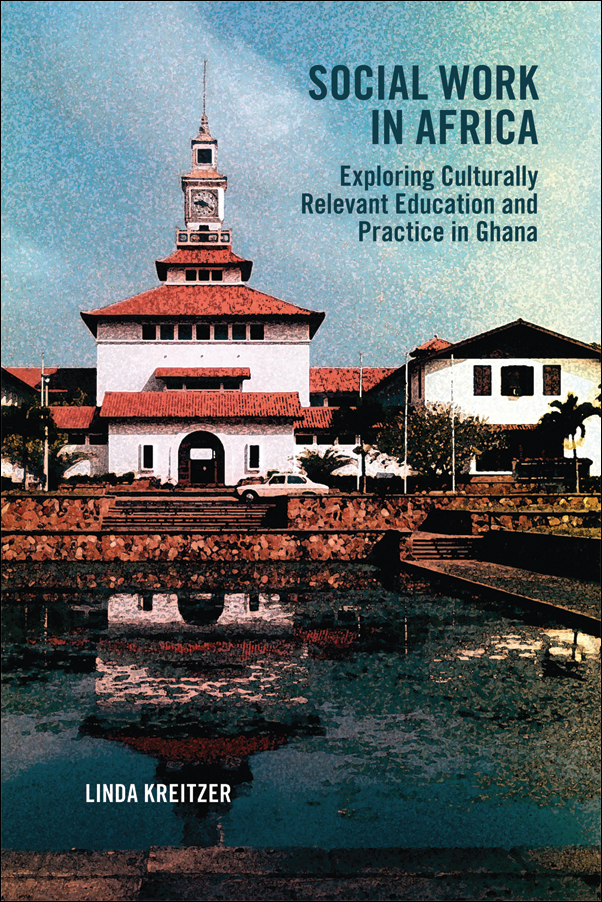
Social Work in Africa: Exploring Culturally Relevant Education and Practice in Ghana
Linda Kreitzer
$34.95 CAD / $41.95 USD
215 pages, 10 illustrations
6 x 9 inches
Paperback: 978-1-55238-510-4
Epub: 978-1-55238-598-2
Library PDF: 978-1-55238-511-1
April 2012
Social Work in Africa offers professors, students, and practitioners insight concerning social work in the African context. Its purpose is to encourage examination of the social work curriculum and to demonstrate practical ways to make it more culturally relevant.
Drawing on her experience as a social work instructor in Ghana with field research conducted for her doctoral thesis, author Linda Kreitzer addresses the history of social work in African countries, the hegemony of western knowledge in the field, and the need for culturally and regionally informed teaching resources and programs. Guided by a strong sense of her limitations and responsibilities as a privileged outsider and a belief that “only Ghanaians can critically look at and decide on a culturally relevant curriculum for themselves,”
Kreitzer utilizes Participatory Action Research methodology to successfully move the topic of culturally relevant practices from rhetoric to demonstration. Social Work in Africa is aimed at programs and practise in Ghana; at the same time, it is intended as a framework for the creation of culturally relevant social work curricula in other African countries and other contexts.
Linda Kreitzer is an associate professor in the Faculty of Social Work, Central and Northern Alberta Region, for the University of Calgary. She has an extensive background in researching and teaching social work in Britain, Ghana, Armenia, and Canada, and in a Liberian refugee camp. Her experience with Ghana began while teaching social work at the University of Ghana through the British NGO Voluntary Services Overseas in 1994. Her resulting questions about the relevancy of utilizing a western-style social work curriculum in an African country led to research for her doctoral thesis and subsequently to this book.
Preface
Introduction: Situating the Context
Prologue
Historical Context
Historical Influences Affecting Social Work Education in Africa
Institutions Affecting Social Work Education in Africa
History of Social Work in Ghana
Conclusion
Cultural Identity
African Culture and Identity How Africa’s History has Influenced African Cultural Identity
African Cultural Identity Today
African Cultural Identity and Social Work
Conclusion
Hegemony of Western Knowledge
Imperialism and Education
Hegemony of Knowledge
Western Knowledge and Social Work Education
Conclusion
Neo-Liberal Policies
The Rise of International Financial Institutions
Present Economic Issues in Africa
Consequences of Neo-Liberal Policies
Social Work and Neo-Liberal Policies
Conclusion
Development and Aid
History of Development Theories
Social Work and Development
Conclusion
Creating Culturally Relevant Education and Practice
Introduction
Recognizing the Need for Change
Using the Ghanaian Context for a Case Study on Curriculum Change
The Process of Identifying Culturally Relevant Curricula
Ghanaian Research Findings
Conclusion
The Future of Social Work in Africa
Appendix 1: Role-Playing Exercise Examining Pre-Colonial, Colonial, and Post-Colonial Africa
Appendix 2: Cultural Awareness / Neo-Liberal Agenda
References
Notes
Index
The book contains a balance of theory, information and practical examples, with a strong call to action and change… The chapters are full of useful questions posed to support this process, encouraging social work educators to question what is taught and whose interests are served. While the focus of this book is very much on social work within Africa, it draws attention to the way ‘Western’ dominated social work is transferred to different cultural contexts and the on-going implications of colonisation and post-colonisation.
—Aisha J. Hutchinson, Social Work Education
A well-researched background for addressing how the colonial and postcolonial context augmented Western hegemony and knowledge in the social work curriculum in Ghana.
—Fibian Lukalo, Africa
The book provides interesting and insightful knowledge about the development of social work education in Africa, which Kreitzer traces to 1945.
—Ann Anka, Ethics and Social Welfare